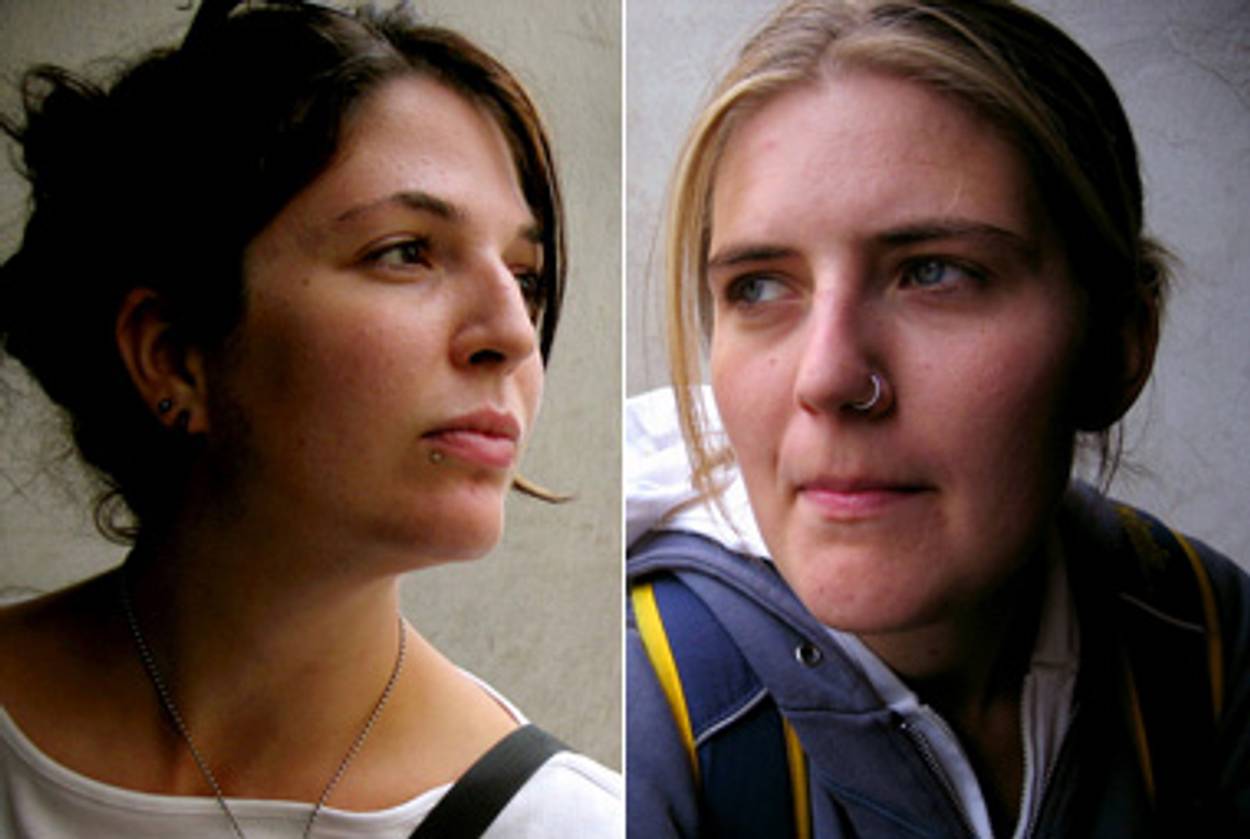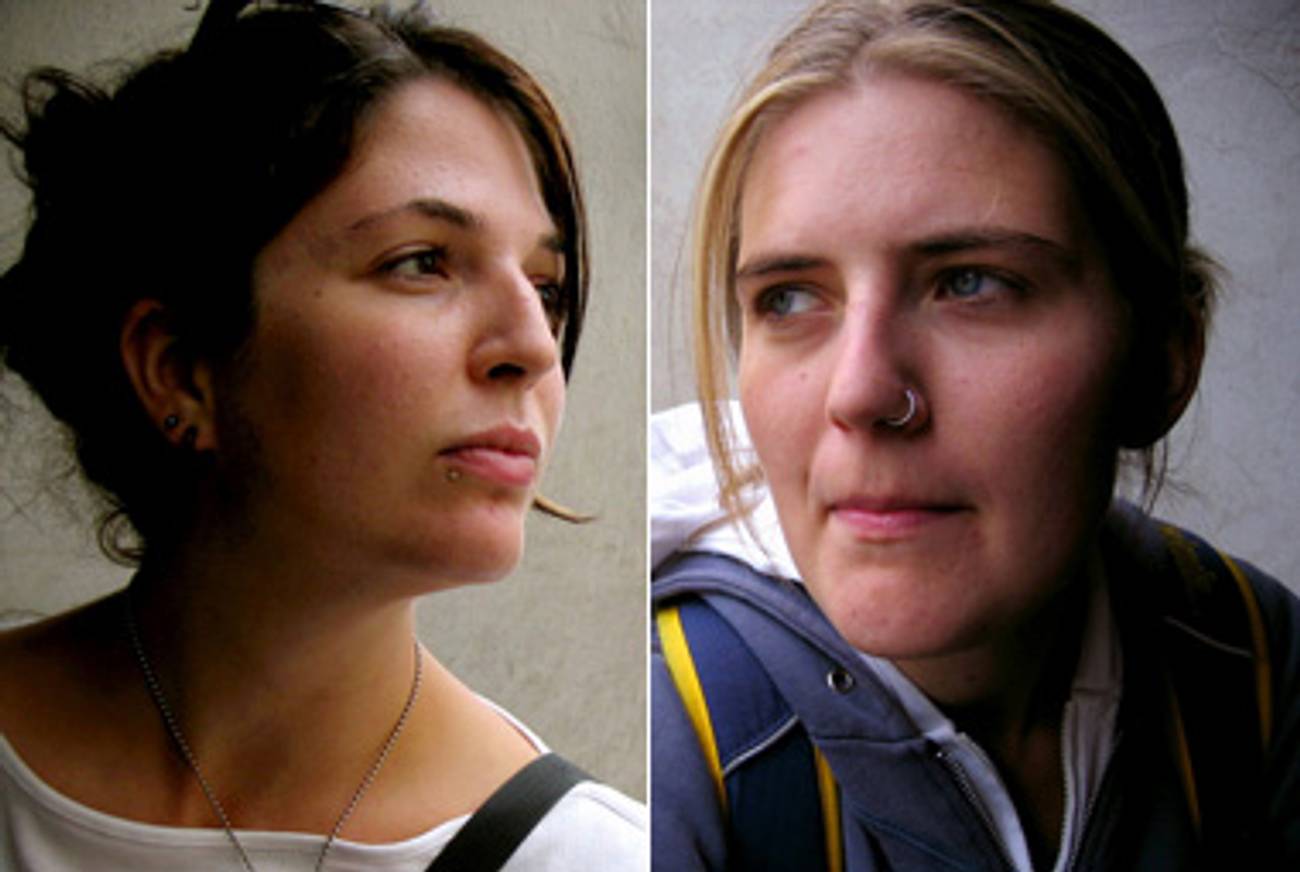Common Ground
A documentary focuses on the grandchildren of Holocaust victims and perpetrators




The emotional landscape depicted in The Descendants Project, a yet-to-be-released documentary about a heritage-tracing trip to Europe undertaken by two best friends—one Jewish, the other the granddaughter of a Nazi soldier—ought to be bleak. And, strewn with Berlin war monuments and concentration camp museums, the film’s physical landscape sometimes is. But the film is also oddly utopian. Its creators and subjects, Michal Blum and Katinka Kraft, are punky young Seattleites who share an earnest belief that tolerance and dialogue can heal the wounds inflicted by history—and everyone else interviewed in the film seems to feel the same way.
The grandchildren of Nazi-era Jews and Germans are still young—in their 20s and 30s, mostly—and their experience has been documented far less than that of the “second generation.” But there are nascent organizations and grassroots efforts in Israel, the United States, Germany, and even Australia, run by and dedicated to the “third generation,” from New York’s 3GNY, which claims to have 800 members who gather for social events and Holocaust-related arts expeditions, to Third Generation, a theater troupe of “3Gs” (of Jewish, German, and Palestinian extraction) in Berlin that performs absurdist takes on life 65 years after the liberation of Auschwitz.
What’s particularly interesting about The Descendants Project is not just the filmmakers’ divergent backgrounds—Kraft’s grandfather was in the Nazi party; Blum’s family came to America before the Holocaust, and doesn’t know what happened to their relatives who stayed behind—but also their unforced synchronicity. While their grandparents and even their parents would have had radically different experiences of the war, for Kraft and Blum, having the Holocaust in their familial memory is a common point of reference. Instead of defining their relation to the war solely in terms of their closeness to victims or perpetrators, they see their distance from and fixation on the event as something they have in common. And, unlike many survivors and their older descendants, they both draw liberal universalist lessons from the Holocaust rather than approaching it purely as the tragedy of the Jews.
“The second generation usually didn’t want to speak, on both sides,” said Israeli filmmaker Chanoch Zevi, who saw generational parallels between the descendants of Holocaust survivors and Nazis he has interviewed for a series of documentaries. “On the German side, because they want to live in peace and not speak about the past; and on the victim side, because they don’t want to tell the horror story again to their children. But the third generation on both sides, they want to speak again and they want to open the scars again and they want to tell the story again.”
Kraft moved from Berlin to Seattle with her American-born mother when she was 12. After a schoolmate called her a Nazi, she explains in the film, she attempted to drop her German identity as quickly as possible. Now, at 31, she is lithe and blond; she and Blum, 33, who’s tall, dark-haired, and big-boned, are clearly of different ethnic stock but just as clearly from the same artsy Seattle subculture: both have piercings and favor hoodies, studded belts, and sneakers; Blum has several tattoos, including a Blakean-looking hamsa and her name written in Hebrew. The two met in a performance art class at Western Washington University and remained best friends in Seattle, where Blum got a degree in massage therapy and Kraft worked on politically charged performance pieces. In conversations over the years, they discovered that one thing they had in common was silence in their families about what had happened back in Europe, and a desire to pierce it.
“I wanted Michal to come to Germany and Poland with me because we had talked about how we had a similar draw to our histories in those countries,” Kraft says in the film. “I never saw us as separate in this. She was my best friend and I wanted her to see where I was born.” The Descendants Project, filmed by Kraft’s longtime girlfriend, documents their experience on the trip, undertaken in 2004. (The film was shot on a shoestring budget; to raise money, they held community events like “Chutzpah: A Queer Jewish Cabaret,” featuring burlesque and performance poetry by Blum, Kraft, and their friends.)
Before they left, Blum pieced together that her paternal grandmother’s immediate family left a small Polish town called Nowy Korcen after World War I and lost touch with relatives back in Europe before World War II. Kraft made a more dramatic discovery once they arrived in Berlin: her father had previously described her grandfather, whom she remembers as a “quiet, caring, loving” man, as having simply “swum along” with the German cause during the war. In fact, her uncle revealed, he had joined the Nazi party and the German army by choice.
“Most of my friends here, their grandparents were just ‘in the army,’” Kraft said over the phone from Berlin, where she’s currently teaching English and slam poetry. “My father was very active in the sixties in political activism and really confrontational with his parents about asking them about their history, but he also inherits this silence.”
By contrast, the filmmakers and their interview subjects—almost exclusively idealistic young people like themselves—seem allergic to silence, instead offering every emotion up to the camera and mining the details of their guilt and shame. Blum, who is encountering Europe and its attendant ghosts for the first time, seems to have a particularly visceral sense that she’s on haunted ground (in one early scene, she sobs at a site of Kristallnacht violence while wearing a t-shirt that says “Too Butch to Cry”). Then there’s Jan-Samsan Schevitz, a young German Jew who’s gone with his father to a therapist, himself the son of an SS officer, to talk about their troubled inheritance; Wojciek Smolen, a young Polish man who, like his parents before him, works at the Auschwitz Museum; Chen Kelfman Khanan, an Israeli student who’s come to Europe to “break stereotypes—to see how Polish people and German people and Dutch people really are”; and Kraft’s precocious, high-school-aged half-sister, who sports blond dreadlocks and is trying to figure out how to feel proud about being German. Jacek Oljenik, a Polish volunteer at a Holocaust education organization, perhaps best sums up their weltanschauung when he says, “I think the fact that the Holocaust happened is a major source of energy for me.”
Other scenes are shot reality show-style, with Kraft or Blum addressing the camera with their anxieties about the trip and each other. “I wish she would get mad at me. That she would feel anger,” Kraft says in one of these confessionals. “Some part of me wants to be hated.” But neither woman seems inclined to hate anyone, except for occasionally themselves. There are a lot of feelings discussed in this film—for which Blum and Kraft are currently looking for a distributor—but not a lot acted out. And indeed, this robs The Descendants Project of real narrative propulsion: German and Jew are so consistently on the same page that there’s never really a question of whether the past will pull them apart. If they are representative of the third generation, we may be in for more earnest experiments in dialogue.
It could be worse.
Marissa Brostoff, a doctoral student in English at the CUNY Graduate Center, is a former staff writer at Tablet and the Forward.
Ari M. Brostoff is Culture Editor at Jewish Currents.